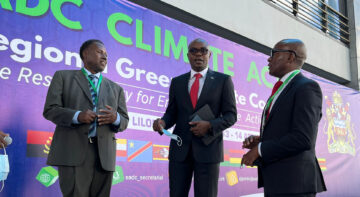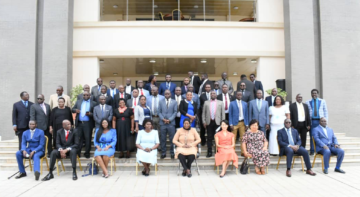Actualités

Yesterday, Wednesday, 28 February 2018, the Parliament of Malawi launched a new project aiming to improve its performance. The new project – the Malawi Parliament Enhancement Project (MPEP), seeks to stimulate reforms to improve the effectiveness and impact of parliament in steering democracy, upholding good governance, and promoting socio-economic development in Malawi.
The MPEP project has two main expected outcomes including improved autonomy and functionality and enhanced, technical capacity and operational efficiency of the Parliament of Malawi in fulfilling its core functions.
While presiding over the launch, the Speaker of the Parliament of Malawi, Hon. Richard Msowoya, said, « I’m happy that we are launching one of the best projects of the Malawi Parliament »¦ As a Malawian, when I look at how we link up with the Executive and the Judiciary, I know that there is a lot that needs to be done. We need to tackle the issues that make us uncomfortable. We know that parliament could do a lot if it had legal autonomy, we know that parliament could do a lot if it had budget autonomy, and we also know that parliament could do a lot if it had operational autonomy. This project is an opportunity for us to address these challenges once and for all. »
The project, funded by the Norwegian Embassy, is being implemented over a period of three years, running from December 2017 « November 2020.
Speaking at the launch, the Leader of the House, Hon. Kondwani Nankhumwa said that « Parliament is a key governance institution that Malawians look to because it represents their interests. Therefore, Parliament requires more capable parliamentarians and a secretariat to deliver its functions beyond expectations. » He added that by addressing the challenges facing political leaders and the Secretariat, the project comes as a complete package that has potential to comprehensively tackle Parliament’s challenges. « The project needs to harness the different capacities available in the different political parties in Parliament in its implementation. »
The project will be implemented with technical assistance from AFIDEP as the lead technical partner, and the Institute of Policy Research and Social Empowerment (IPRSE).
The Leader of Opposition, Dr Lazarus Chakwera, thanked the Speaker for initiating a process that will enable Parliament to look at itself critically because this is the only way it will be able to improve its services to Malawians. Said he, « Anything that helps us to do our job better « more efficiently, more effectively, more independently « I commit that this kind of process will receive support from the opposition. » He concluded that « The project is just a catalyst but we are the ones with the political will to address these challenges so that we can serve all Malawians. »
The Clerk of the Parliament of Malawi, Mrs Fiona Kalemba, was also present at the launch. She said, « This project will transform the way we do business in the Malawi parliament. » She added that given the many challenges that they face as a parliament, « there is a need for continuous parliamentary reforms especially because as Parliament we sign annual performance contracts with the government, and these contracts require us to change from doing business-as-usual to focus on results ».
The Norwegian Ambassador H. E. Kikkan Haugen said that the Embassy funded the project because it takes a holistic approach to responding to challenges facing parliament. He added that « This project does not come with all solutions, it comes with suggestions and possible solutions, but focuses on working with you to jointly find solutions to these challenges. We will be flexible as the project evolves to meet the needs of the parliament. »
AFIDEP’s Executive Director, Dr Eliya Zulu said the Institute is very excited about the project and will work hand-in-hand with parliament and other key partners in supporting project implementation. He concluded saying « Launching this project is not the achievement, the achievement is implementing project interventions to address the challenges highlighted that have already been mentioned ».
Related Posts





